Fairfax County Bat Removal
Welcome to Fairfax County Bat Removal! We are Virginia bat removal specialists. It is important to know that bats are protected by Virginia law, and are beneficial animals to have in the environment. We do not kill any bats during our bat removal process. Never hire a pest control company or anyone who says they are a Fairfax County bat exterminator. For correct and effective bat removal, you want a company that specializes in humane bat colony extraction. Our process is not only the only legal method in Virginia, but it is the most effective. We have a 100% success rate in our bat control process. We perform our industry-best 32-point inspection of your house or building, and seal shut all bat entry holes down to 1/4 inch as part of the removal process, during which we remove the colony via special one-way exclusion devices specific to your architecture. Once all bats are safely out, we permanenetly bat-proof the structure. We also provide guano (bat droppings) removal and decon. Click on our Fairfax County Bat Control Prices page to find out more about our prices for bat control work. We work 24/7/365, and would love to talk to you about your bat problem. Call us any time at 571-347-9811 to discuss it, discuss our pricing, and if you wish, set up an appointment at your convenience, often same-day.
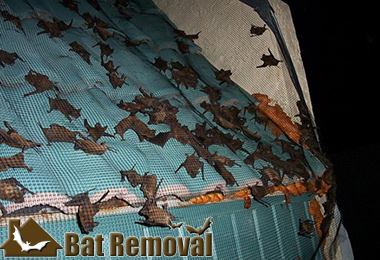
Fairfax County Building and Attic Inspections
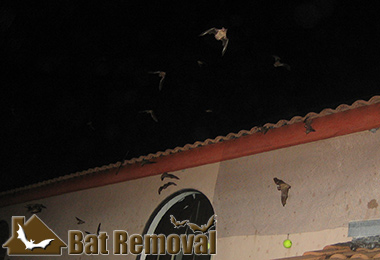
No-kill Virginia Bat Extraction
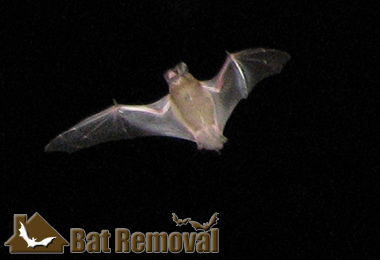
Guano Cleanouts - Serving all of Virginia
Call 24/7 to discuss your bat problem.
Same-day or next-day appointments.
32-point inspection of your property.
Written estimates for bat removal project.
Fully state licensed and insured.
Residential and commercial service
100% no-kill Fairfax County bat extraction
Complete bat-proofing of your building
Compliance with all Virginia, federal laws
Guano removal and attic decontamination
Our Service Range - 571-347-9811
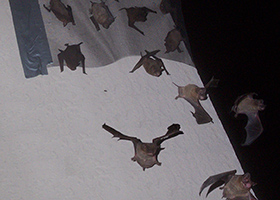
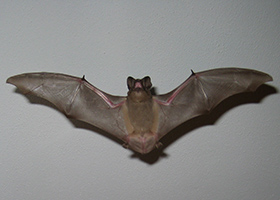
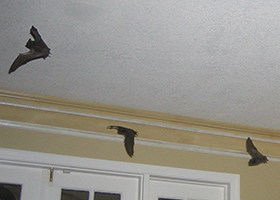
4 Tips in Finding a Bat Hiding in Your House
Since bats are quiet creatures, it is relatively difficult to determine their presence in your house. Your pets would be the first to discover the activities of the bats. Once they do, be sure that your pets and your kids will stay away from the bats. Bats can carry zoonotic diseases and parasites that can transfer to humans and pets. Bats are tiny creature that can easily fit in a cramp and hard-to-reach areas that makes it challenging to find them.
Essential Tips to Find the Bat Hiding in the House
You should never panic when you discover signs of bat infestation in your house. Bats are docile creatures and only 1 percent of them are potential carrier of rabies. In addition, they will usually stay away from humans.
1. Start on the Upper Section Before Moving on the Lower Part of Your House
Bats are known to occupy the highest part of the cave where the temperature is highest. Therefore, when it invades your house, you must start your inspection on the higher areas. The high shelves and the opening vents on our ceiling are where they will likely roost. In case you notice the bat dropping or urine stain on the surface, be sure that you have a ladder that will look in the high places. Start on your attic and gradually move to your basement. You should never miss the places that you don't normally visit. Check each closet and curtain in the attic.
2. Check on the Dark and Warm Areas
Bats love to roost in dark and warm places that resembles the ambiance of the cave. With their small body frame, they can basically fit in places you don't expect them to be. They can be found in the small crevices and gaps. They can even roost in the void of your walls. Your garage and basement can also be a possible shelter for the bat.
3. Look for Bats at Daytime
Bats are nocturnal creatures. Therefore, it is recommended to search for them while they are resting in the daytime. Bats will usually roost in our eaves and joist. If you are housing a colony of bats, it would be difficult to miss the irritating scent of their urine and guano. However, if it is only one bat, it is highly likely that they were lost and want to escape immediately. Simple close the interior door and open the window that will direct them outside.
4. Avoid Touching the Bats
You should avoid touching the bats to prevent the transmission of the disease that they may carry. You should also wear face mask and gloves. If you have a broken skin, be sure to wear proper clothing that will hide your wound. Their dropping will contain fungal spores that you can accidentally inhale.
Finally, you may want to ask the professional to complete the inspection if you suspect that you have a full-blown infestation. They will not only successfully find the bats; they can also determine the entry holes and the species of bats that you are dealing with.

